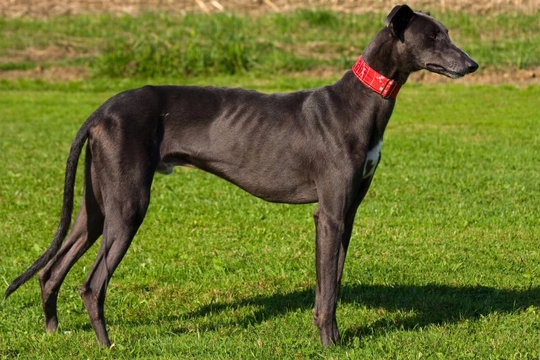
Five universal personality traits of the Greyhound
The Greyhound is one of the larger sighthound dog breeds, and one that was historically used for hunting and sport such as hare coursing. Today, the Greyhound is most widely kept in working roles as a racing dog, and huge numbers of ex-racing greyhounds are rehomed in the UK every year after their life as a racer comes to an end.
There is a lot to recommend the greyhound as a family pet for people of all types, and they tend to be incredibly gentle, very loving, and highly affectionate. However, they are not without their challenges, some of which can make owning a greyhound hard work and potentially problematic for those that do not know them well.
In this article, we will look at five almost universal personality traits of the greyhound. Read on to learn more!
They like to chase
One of the most obvious and pronounced personality traits of the greyhound is their incredibly highly developed prey drive, which is greater than that of most other breeds. Both greyhounds that were historically bred for hare coursing and lamping and those bred today for racing are valued for their fast running speed and ability to catch their prey, and so this trait is not only inbuilt and instinctive, but also selectively bred for.
Within the home, this means that your greyhound is going to find life challenging when they are taught that they are not to pursue smaller animals such as cats and wildlife, and teaching good recall to a greyhound can be challenging and in some cases, only partially successful. When outside of the home, you may need to muzzle your dog when off the lead, for the protection of other animals.
They are very fast!
The greyhound is one of the fastest land animals in the world, coming in second only to the cheetah. This has only been enhanced by selective breeding to produce ever faster racing dogs, and seeing a greyhound at a flat-out run can be very impressive!
When this is combined with the superior prey drive of the dog, it is easy to see why they can potentially be such a menace to would-be prey animals, and why ownership of the greyhound and their management outside of the home needs to be tackled carefully.
Like all athletes, a greyhound at a full run in pursuit of something becomes very single minded, and getting their attention and recalling them can be very challenging.
…But they are also very lazy
It comes as a surprise to many people to learn that the greyhound, as fast as they are, is not a breed that needs hours and hours of exercise each day. Their build and speed mean that they are made for the sprint rather than the marathon, and they soon tire out after they have expended their energy in an explosive burst of speed! A couple of moderate-length walks per day, including supervised off-lead time to allow your greyhound to run is all that is needed to keep them fit and happy, and when at home, expect your greyhound to spend a lot of time asleep, or fighting you for the best spot on the sofa!
They don’t like to be alone
Greyhounds are very loving, personable dogs, and even those that have been raised in a racing kennels and not within a home and the love of a family tend to adapt to the benefits of suburban life very quickly. They are gentle, kind and very affectionate, and enjoy company. They dislike being alone and need plenty of love and attention, and one lone greyhound that is left alone a lot will soon pine and become lonely.
Make sure that you have plenty of time to dedicate to spending with your greyhound, and consider getting them a canine friend for company. Some greyhounds can even live happily and bond with a cat, but due to their strong, instinctive prey drive, this needs to be carefully managed during the early days!
They are excellent beggars
Despite their lithe, lean builds, the greyhound is very food-oriented, and will go a long way to earn themselves a reward! They are also excellent beggars, instinctively knowing who is likely to have a pocket full of treats and a propensity to share them, turning on the charm with the big, soft eyes and lots of adoring attention!
They are also often quick to hoover up dropped table scraps, and even help themselves to food left unsupervised for a moment or two, so care must be taken when dinner is in the offing! Added to this, many greyhounds will scavenge from bins and pick up bits of detritus out on walks, although muzzling can help with this too.
While greyhounds don’t tend to get particularly fat, it is important to remember that too many scraps or treats are bad for dogs, and that some foods are actually harmful, so manage this in your own dog to ensure that they stay healthy!



